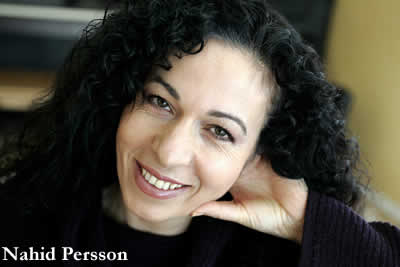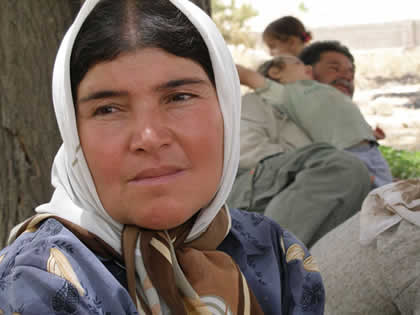 Nahid Persson was born and raised in Iran. Throughout her teen years, she was politically active and a supporter of human rights. Nahid participated actively in a revolution against the Shah 29 years ago, and then against the new religious regime that took over the country after Shah. Nahid was forced to flee the country 25 years ago. Before arriving in Sweden, she worked at a newspaper and wrote articles about women in various social groups. In Sweden some other Iranians and Nahid started a local radio station while also doing radio shows for the Swedish Educational Broadcasting Company. In 1993 Nahid started attending a Film and TV course and realized that filmmaking was the form of expression she had been looking for, a way to convey other people’s voices. In 2003 Nahid attended The Master class at Dramatiska Institutet.
Nahid Persson was born and raised in Iran. Throughout her teen years, she was politically active and a supporter of human rights. Nahid participated actively in a revolution against the Shah 29 years ago, and then against the new religious regime that took over the country after Shah. Nahid was forced to flee the country 25 years ago. Before arriving in Sweden, she worked at a newspaper and wrote articles about women in various social groups. In Sweden some other Iranians and Nahid started a local radio station while also doing radio shows for the Swedish Educational Broadcasting Company. In 1993 Nahid started attending a Film and TV course and realized that filmmaking was the form of expression she had been looking for, a way to convey other people’s voices. In 2003 Nahid attended The Master class at Dramatiska Institutet.
RealReel Production was founded in 1994 on the strength of the producer/director Nahid Persson’s years of experience producing high quality documentaries for the Swedish and international market. RealReel Production focuses on films about social and politically issues revealed in a sensitive and naked way. The latest films have been shown worldwide and they have always been produced on budget.
Cinema Without Borders: Please tell us a little bit about your film “Four Wives, One Man” that will be screened at the Los Angeles Film Festival.
Nahid Persson: “Four Wives, One Man” is the story of a family living in a village north of Iran. This family includes a man, his four wives, his twenty kids, his grandchildren, and his mother, all living in the same house. The movie shows the usual family problems that of course in these circumstances quadruple! However this is not the main focus of the film. But there are parts in the film that you see the friendly relationship of a few of the wives together; they laugh and talk, and also they are very open when talking about anything to me. One thing that becomes clear in the film is that even these four women are very strong, but it is still very hard to deal with living with a man who has four wives. They have no chance to make their own decisions and choices in life. Separation or divorce is also out of question as they do not want to leave their own kids to be raised by other women. They are all trapped in a desperate situation.
grandchildren, and his mother, all living in the same house. The movie shows the usual family problems that of course in these circumstances quadruple! However this is not the main focus of the film. But there are parts in the film that you see the friendly relationship of a few of the wives together; they laugh and talk, and also they are very open when talking about anything to me. One thing that becomes clear in the film is that even these four women are very strong, but it is still very hard to deal with living with a man who has four wives. They have no chance to make their own decisions and choices in life. Separation or divorce is also out of question as they do not want to leave their own kids to be raised by other women. They are all trapped in a desperate situation.
CWB: Is the focus of your film polygamy or does it deal with other women’s issues also?
NP: The subject of “Four Wives, One man” has allowed me to deal with major problems in women’s lives in that part of the world. The “man” is also in the film, but you don’t see much of him. The focus is on the women’s/ female stories. While making the film, I felt that talking to them during the interviews was like attending therapy sessions for them. There was even a competition among them to be the first one interviewed or spend more time talking to me. They would send their kids with messages about meeting them for the interview. They knew this was a movie about their problems and did not want to lose the opportunity to express them.
CWB: Is this your first time attending the LA Film Festival?
NP: Yes
CWB: Has “Four Wives, One Man” participated in other festivals or screening events?
NP: Yes, you know this is officially a Swedish film and therefore it was in theaters in Sweden for a few months and then Romani. “Four Wives, One Man” has also participated in several film festivals around the world.
 CWB: Are there any other countries that have acquired the rights to “Four Wives, One Man” public screenings?
CWB: Are there any other countries that have acquired the rights to “Four Wives, One Man” public screenings?
NP: Two years ago when I pitched the idea for this film in Amsterdam, several countries bought its theatrical rights even before the movie was shot. I believe by now sixteen countries have the screening rights to “Four Wives, One Man.”
CWB: What has been the reaction of the Iranians and other Muslims who had seen the film?
NP: A few days ago I was at the screening of “Four Wives, One Man” in Washington. Like most of the other screenings of “Four Wives, One Man” the theater was full. (I am not sure if it is the name of the film that attracts the audience or not, but there are a lot of people that don’t find a seat and watch the whole film standing). A young Iranian-American man said, “Please stop showing this film as everybody thinks we are all like that. This film will give us all a bad reputation!”
My answer to such comments is: “Do you care about all the women in those countries suffering from discriminations and living with no rights? A film like “Four Wives, One Man” is their voice.”
But I have to say that the majority of the reactions to “Four Wives, One Man” have been very positive. Women especially who have watched the film express their satisfaction with the direction that the film takes.
CWB: Thank you, we wish you luck and hope that “Four Wives, One Man” succeeds in its goals.

